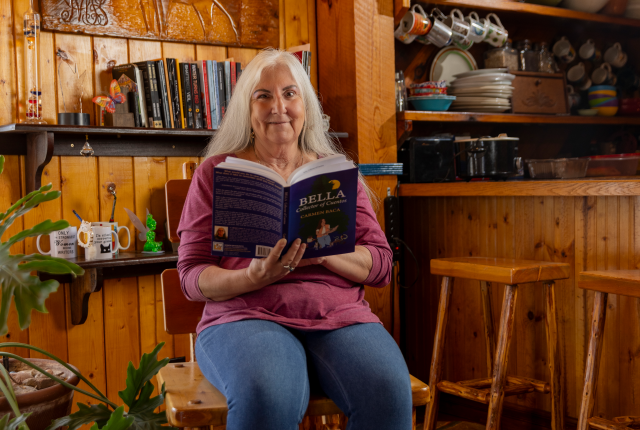THE SPRING MORNING started the same as any other for writer Carmen Baca. But around 2 p.m. on April 6, 2022, from her home in Cañoncito de las Manuelitas, Baca noticed smoke snaking across the sky off Hermits Peak. Five days later, the first caravan of state police arrived and warned her that the fires were closing in. On April 22, the power shut off, and by 5 p.m., the sky was dark with smoke.
“It was the worst night of my life,” says Baca, who left her house—where her family had lived for generations—unsure of what would be left when she returned. Somehow, Baca’s home was unscathed after the devastating wildfire that ultimately claimed more than 341,000 acres. But many families in the community lost everything. “We were all shell-shocked,” she says. “It’ll take 20 years for the land to come back to what I remember.”
The profound loss of the Calf Canyon/Hermits Peak wildfires underscored the historic and cultural importance of the communities in Mora and San Miguel counties that Baca has documented for most of her life. Growing up 20 miles north of Las Vegas, Baca learned quickly about her Spanish ancestors and customs. Both of her parents were active members of community associations and enlisted Baca’s help in everyday rituals, like cleaning the local morada, tidying the church, and preparing for Lent.
“Tradition, the rituals of my childhood, I took them for granted because they were there,” she says. “Now that they’re disappearing, I have a new appreciation for what we’ve lost as a culture.”
A voracious reader, she gravitated toward English and history. For 36 years, she taught English at West Las Vegas High School before retiring in 2014. In her thirties, fueled by those everyday tasks in the hills, Baca began to write history, folklore, and stories of her norteño culture.
Her work emphasized what she understands to be the key distinction between norteños and other Hispanic cultures in the U.S.: herencias from the 16th century that include unique Spanish-language patterns and customs that have been preserved in insular local communities. “The majority of us who have been here for all of our lives have been here because our ancestors settled here in the 1500s,” she says. “It’s the land that binds us here.”
Baca’s lengthy writing career includes six books and 80 short stories. “Los Norteños,” an essay chronicling her experience of the wildfires, appeared in the fall 2022 issue of Latin@ Literatures and earned a nomination from the Best of the Net. Her record of the disaster is also anthologized in Up from the Ashes, We Rise, a collection of writing about the Calf Canyon/Hermits Peak wildfires published by Las Vegas Lit Press.
Since the fires, Baca has participated in a variety of local readings and donated her books to libraries to mitigate the growing threat of cultural extinction. At her readings, Baca notices that younger listeners seem determined to pick up the mantle and document their own stories as a means of preservation. “Having a Hispanic teacher from our own community was important,” says Consuelo Gallegos, who had Baca for seventh-grade English more than 40 years ago.
Although Gallegos works in Salt Lake City now, Baca’s writings have a way of bringing her closer to home, while educating her about her roots. “Her writing will teach future readers about our norteño and mestizaje roots and keep our stories alive,” Gallegos says.



